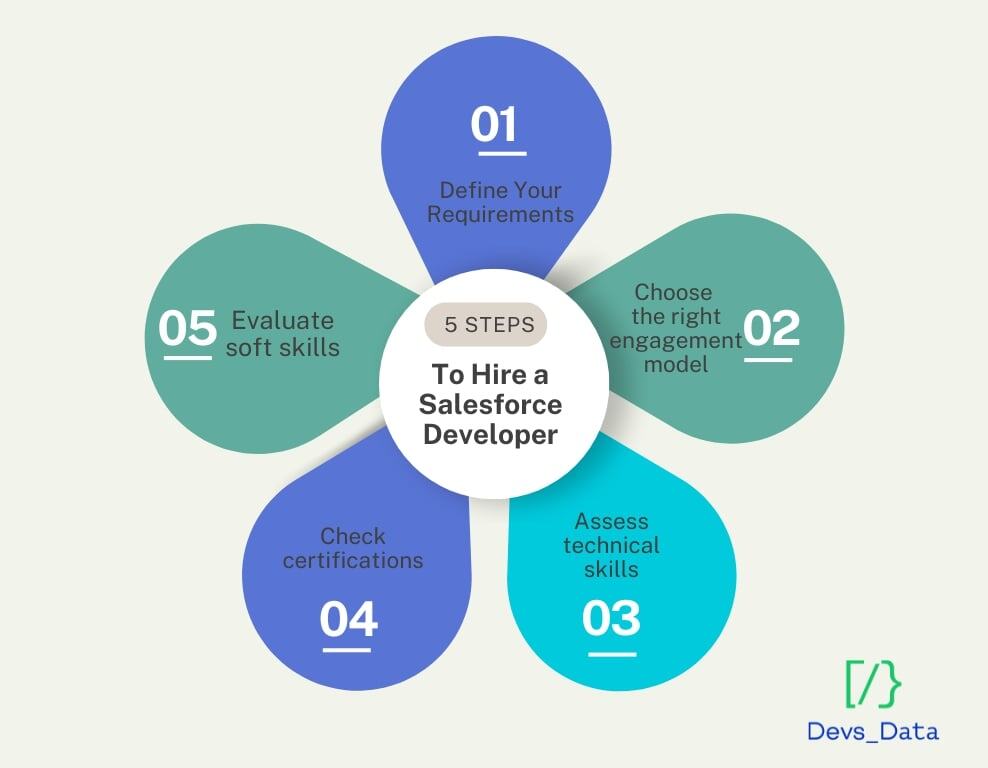


Salesforce has evolved far beyond its initial role as a customer relationship management (CRM) tool. Today, it helps businesses manage sales pipelines, automate marketing campaigns, deliver personalized customer support, and build custom applications, all within a unified cloud-based ecosystem powered by AI. This makes it an essential resource for businesses in every industry. As more companies adopt Salesforce, the need for talented Salesforce developers continues to rise. In fact, 9.3 million new Salesforce-related jobs are expected to be created worldwide by 2026.
According to a December 2023 IDC study, the Salesforce ecosystem, which is driven by AI-powered cloud solutions, is expanding rapidly. The study predicts that between 2022 and 2028, Salesforce’s AI-driven cloud solutions will generate $2.02 trillion in new business revenues and create over 11 million jobs globally.
“The global business revenue impact of Salesforce’s AI-powered cloud solutions was $312 billion in 2022, with expectations to triple to $948 billion by 2028. This growth is fueled by AI’s increasing role in sales, service, marketing, commerce, and IT.”
With this growth and the increasing demand for AI-driven tools across business functions, hiring skilled Salesforce developers is no longer just beneficial. It is essential for companies aiming to stay competitive, innovate, and scale effectively.
In this article, we’ll explore the key factors to consider when hiring Salesforce developers in 2025 and how DevsData LLC, with its extensive experience in sourcing and placing skilled developers, can help you meet your business needs.

Salesforce, which started in 1999 as a cloud-based CRM, has grown into a powerful AI-driven platform in 2025. It now offers automation, real-time data processing, and tailored solutions for different industries beyond just CRM functions.
With the launch of Agentforce 2.0, a next-generation AI customer service platform, and Einstein GPT, Salesforce’s generative AI assistant for CRM, the company has integrated advanced AI into its core operations. This allows businesses to automate processes like customer support and sales forecasting through conversational interfaces and predictive insights. Salesforce Data Cloud also helps companies bring together vast amounts of unstructured data in real time, enabling smarter decisions across all departments.
Salesforce’s Hyperforce infrastructure has set the standard for enterprise deployments, providing scalable, regionally compliant cloud environments that boost both speed and security. The platform is also expanding into sectors like healthcare, finance, and manufacturing, offering specialized clouds that meet industry-specific regulatory needs, such as Health Cloud’s integration with Electronic Health Records (EHRs) and Financial Services Cloud’s compliance tools.
“As more businesses start using AI to automate their operations, the role of Salesforce developers has changed. The focus is no longer on basic customization but on deep platform expertise, integration, and a solid understanding of AI, automation, and security.”
Companies are now looking for Salesforce developers skilled in:
With AI transforming business workflows, Salesforce developers need to keep up with new technologies and methods to remain competitive in this fast-changing job market.

A Salesforce developer customizes and extends the Salesforce platform to match business goals. They work closely with stakeholders across various departments, including sales, marketing, customer service, and operations, to develop solutions that streamline workflows, automate tasks, and enhance the user experience.
Below are the key responsibilities of a Salesforce developer:
Salesforce developers are often tasked with tailoring the platform to match the unique workflows and processes of a business. This involves creating custom objects, fields, record types, validation rules, and process automation flows using tools like Process Builder and Flow.
Developers team up with business analysts and stakeholders to analyze workflows, gather business requirements, and translate them into functional configurations that improve efficiency and user experience. This requires a solid understanding of business processes and the ability to think critically about how technical solutions impact broader organizational goals.
For more complex logic that goes beyond point-and-click configuration, developers use Apex, Salesforce’s proprietary Java-like programming language.
“Apex is essential for writing custom triggers, scheduled jobs, and business logic that respond to database events or user actions.”
Developers also use it to build RESTful APIs and handle asynchronous processes such as batch operations.
Creating intuitive and responsive user interfaces is critical for end-user adoption. Developers leverage LWC, Salesforce’s modern UI framework, to build custom components that enhance user interaction. Whether it’s a dynamic dashboard, a complex form with conditional logic, or a custom modal window, UI development focuses on making the platform visually appealing and user-friendly.
Modern Salesforce implementations rarely happen in isolation. Developers are responsible for integrating Salesforce with other systems, such as ERPs, marketing tools, payment processors, or proprietary enterprise platforms. This is typically done through REST/SOAP APIs, middleware like MuleSoft, or tools like Salesforce Connect. A strong understanding of authentication protocols (OAuth, JWT) and data synchronization patterns is essential to ensure reliable, secure, and real-time integration.
Efficient data structure design is critical for both performance and long-term scalability. Salesforce developers define the relationships between objects (lookup, master-detail, junction), optimize record access through sharing rules, and ensure data integrity across the system. When migrating data from legacy CRMs or spreadsheets, developers use tools like Data Loader or custom scripts to transfer and transform data safely.
Salesforce developers perform unit and integration testing and use debugging tools like the Developer Console and Debug Logs to trace and fix issues. With Apex requiring a minimum 75% code coverage before deployment, testing is not only best practice but a necessity for any successful release.
Post-deployment, Salesforce developers remain involved in monitoring system performance, resolving bugs, and identifying opportunities for improvement. They review usage metrics, gather feedback from users, and refine workflows or components to better align with evolving business needs.
| Skill Area | Salesforce Developer | Full-Stack Developer |
|---|---|---|
| CRM Platform Expertise | Strong knowledge of Salesforce tools and ecosystem | Generally not specialized in CRM platforms |
| Apex / Platform Languages | Uses Apex, Lightning Web Components, and SOQL | Not used; relies on general-purpose languages |
| Frontend Development | Limited to LWC or Visualforce | Uses frameworks like React, Angular, or Vue |
| Backend Development | Apex for platform-specific logic | Uses Node.js, Python, Java, or other languages |
| System Integration | Experience with REST/SOAP APIs and Salesforce Connect | Works with APIs, GraphQL, and message queues |
| Database Skills | Works with Salesforce object relationships | Strong in SQL, NoSQL, and schema design |
| DevOps & CI/CD | Often relies on platform tools or admin support | Builds custom CI/CD pipelines and deployment flows |
| Testing | Writes Apex test classes with code coverage requirements | Uses unit, integration, and end-to-end testing tools |
| Custom App Development | Builds apps within the Salesforce platform | Builds standalone or web-based applications |
Hiring the right Salesforce developer is crucial for successfully implementing and customizing Salesforce for your business. It’s not just about reviewing resumes; taking a strategic approach helps you find the best talent for your specific needs. Here’s a step-by-step guide to make hiring the right developer easier and more effective.

Before starting the search for a Salesforce developer, it’s crucial to have a clear understanding of your project’s scope and objectives. Are you looking to build a new custom application, automate marketing workflows, or integrate Salesforce with other business systems like ERP or eCommerce platforms? The specific needs of your project will determine the type of Salesforce developer you need. For instance, a developer focused on integration might need a deeper understanding of APIs and middleware, while one working on a custom app might need experience with Apex and LWC. Defining your requirements up front helps you target the right talent for the job.
Once you’ve defined the project scope, it’s essential to choose the right engagement model that aligns with your business needs.
“A full-time in-house Salesforce developer might be the best fit if you’re looking for a long-term, dedicated resource who will integrate with your team. However, if your project requires specialized expertise or you need extra support for a defined period, consider staff augmentation or outsourcing options.”
Remote developers or contractors can provide high-level skills on a temporary or project-based basis, offering flexibility and cost-efficiency. Understanding whether the developer should work onsite or remotely and whether the role is ongoing or project-based will help you make the right choice for your recruitment strategy.
Salesforce developers need a deep understanding of the platform’s various tools, languages, and frameworks. Therefore, conducting coding assessments and technical interviews is essential to evaluate candidates’ proficiency in key areas such as Apex, LWC, integration techniques, and the latest Salesforce best practices. Practical tasks, such as writing Apex code or solving real-world problems, can demonstrate their ability to solve complex issues. This helps learn if the developer is technically capable and familiar with the nuances of Salesforce development.
Salesforce certifications are some of the most reliable indicators of a developer’s expertise and commitment to the platform. A Salesforce Certified Platform Developer I or II certification demonstrates knowledge in core Salesforce development. In contrast, a Salesforce Certified Application Architect or Technical Architect certification indicates a higher level of mastery, especially for complex, enterprise-level solutions. Looking for these certifications ensures that the candidate has met Salesforce’s rigorous standards, giving you confidence in their ability to deliver quality solutions.
While technical expertise is crucial, soft skills are equally important for Salesforce developers, especially when they work within cross-functional teams. Strong communication skills are essential for explaining complex technical concepts to non-technical stakeholders and collaborating effectively with business analysts, project managers, and administrators. Additionally, problem-solving abilities are a must, as developers often face complex challenges that require creative and efficient solutions. The ability to work well in agile environments and adapt to evolving requirements will also help determine if the developer can thrive in dynamic, fast-paced projects.
Website: www.devsdata.com
Team size: ~60 employees
Founded: 2016
Headquarters: Brooklyn, NY, and Warsaw, Poland
Finding the right Salesforce developer takes more than scanning resumes, as it requires a structured, thoughtful approach. That’s where DevsData LLC comes in. With over 8 years of experience in tech recruitment, the company helps businesses connect with skilled Salesforce professionals who match both the technical and cultural needs of the role.
DevsData LLC has worked with a wide range of clients, including startups and global companies such as Cubus, Skycatch, Varner, and Novartis. One notable example is the collaboration with Nearmap Inc., a leading US-based InsurTech company specializing in geospatial analytics. DevsData LLC helped fill four critical senior roles, including a Senior Salesforce Developer, who supported system integration as part of Nearmap’s efforts to enhance its AI-powered mapping platform and improve internal operations.
Their recruitment process is built to balance efficiency with quality, helping teams hire faster without compromising on standards. They hold a government-approved recruitment license and maintain a database of over 65000 pre-vetted candidates. This means they can quickly identify professionals with the right Salesforce skills, including experience with Apex, Lightning, and platform integrations.
Each candidate goes through a thorough 90-minute interview conducted by experienced developers and senior recruiters from Europe and the US. These sessions assess not just technical knowledge but also communication and collaboration skills. Moreover, DevsData LLC operates on a success-based model, meaning clients only pay if a candidate is successfully hired. They also offer a guarantee period, replacing the candidate or offering a refund if things don’t work out, at no additional cost.
DevsData LLC has a strong history of successfully delivering top Salesforce and technical talent for complex, high-demand roles. In another project, DevsData LLC partnered with a global pharmaceutical leader to hire a tech lead for a Salesforce-based, public-facing platform. The role required deep expertise in customizing Salesforce to support complex user workflows, data compliance, and integration with internal systems.
To meet this challenge, DevsData LLC designed a tailored recruitment process that included HR screenings, Salesforce-specific technical evaluations, and multi-stage interviews conducted over a three-month period. The successful placement in the client’s Boston office had an immediate impact on the platform’s scalability and performance. Impressed with the result, the client expanded the partnership by assigning four additional Salesforce-related roles across Singapore, London, Berlin, and Tel Aviv. The project demonstrated the company’s ability to deliver highly specialized Salesforce talent across global markets.
Other complex projects include:
The video below discusses DevsData LLC’s recruitment services in detail, explaining how they connect top IT talent with leading companies worldwide and streamline the hiring process for specialized roles.
Beyond recruitment, DevsData LLC also offers software development outsourcing powered by a team of highly skilled, Google-level engineers. With over 100 successful projects delivered for more than 80 clients, the company provides expertise in web development, mobile app development, product development, cloud infrastructure, UI/UX design, Big Data, and complex backend systems.
As Salesforce continues to grow and evolve into a dynamic, AI-driven platform, the demand for skilled Salesforce developers is stronger than ever. In 2025, businesses across various industries increasingly rely on Salesforce for everything from AI-powered CRM solutions to automation and real-time data processing. As the platform grows, so does the need for developers who can customize and enhance it to meet specific business requirements.
DevsData LLC, with over 8 years of experience in sourcing and placing top-tier Salesforce talent, is perfectly positioned to help your business meet these growing demands. By leveraging its structured recruitment process, access to a vast network of pre-screened professionals, and global expertise, DevsData LLC ensures that your Salesforce development needs are met with precision and excellence.
In addition to recruitment services, DevsData LLC offers Employer of Record (EoR) services, helping businesses manage payroll, taxes, benefits, and compliance. This enables companies to focus on their core objectives while fully adhering to local regulations. Their business process outsourcing (BPO) services streamline operations and improve resource efficiency. With strategic HR advisory, DevsData LLC tailors solutions to meet the unique hiring needs of Salesforce teams, ensuring you stay focused on driving business success while maintaining high recruitment standards and operational excellence.
For more information on how DevsData LLC can assist with your Salesforce development needs, visit www.devsdata.com or reach out at general@devsdata.com.
Frequently asked questions (FAQ)
DevsData – your premium technology partner
DevsData is a boutique tech recruitment and software agency. Develop your software project with veteran engineers or scale up an in-house tech team of developers with relevant industry experience.
Free consultation with a software expert
🎧 Schedule a meeting
FEATURED IN


DevsData LLC is truly exceptional – their backend developers are some of the best I’ve ever worked with.”
Nicholas Johnson
Mentor at YC, serial entrepreneur


 Build your project with our veteran developers
Build your project with our veteran developers
 Explore the benefits of technology recruitment and tailor-made software
Explore the benefits of technology recruitment and tailor-made software
 Learn how to source skilled and experienced software developers
Learn how to source skilled and experienced software developers




Categories: Big data, data analytics | Software and technology | IT recruitment blog | IT in Poland | Content hub (blog)
